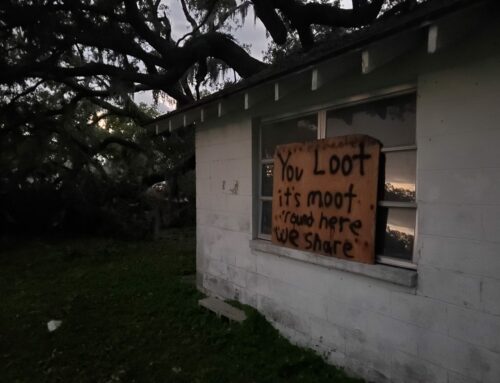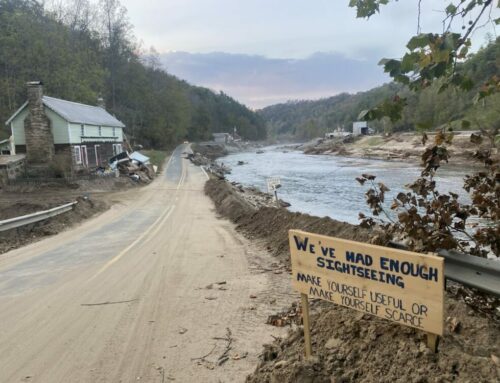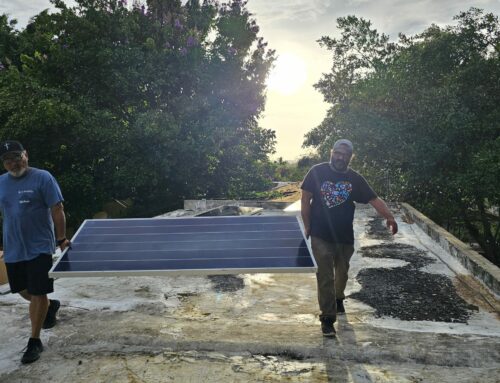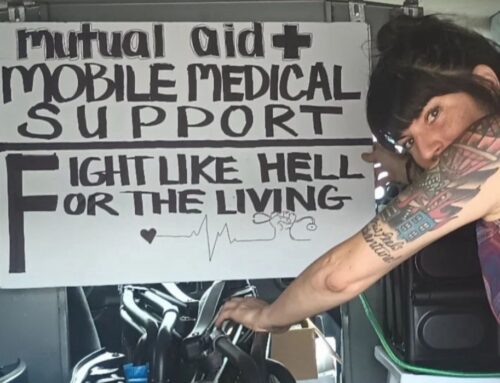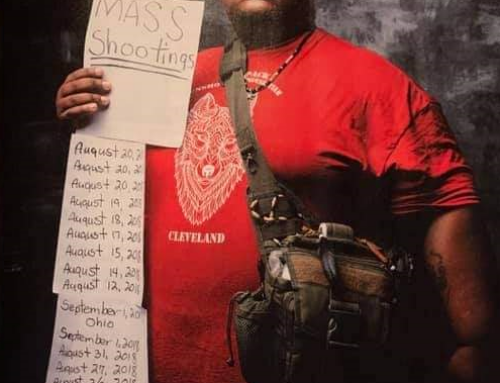On December 11, 2018, in Panama City, Florida, a large tent city located in the parking lot of a church was transformed into a demolition site. Hundreds of people were left with nowhere to go, and many had all of their possessions destroyed. The eviction was overseen by the Alabama-West Florida Conference of the United Methodist Church (AWFUMC). Below is the story of how they mislead and manipulated the most vulnerable people in Panama City, and left hundreds worse off than before they arrived.
Coffee with Comrades
“That coffee is too weak,” one volunteer suggested. “Let’s make the next batch extra strong and combine them so it will even itself out.” We were preparing to visit the nearby tent city on the morning of December 11, 2018. The previous night, Panama City saw temperatures in the 30s, and we wanted to continue our support of the residents of the makeshift community who were housed in vehicles, tents and tarps.
While we were serving the coffee on site at Forest Park United Methodist Church, six police cars arrived.

Police talked briefly with United Methodist officials inside the church, then began their mobile loudspeaker warnings, telling residents they had three hours to pack up all their belongings and leave the premises or they would be arrested. The Panama City mayor backed the eviction saying, “This cannot exist.”
The tent city had sprung up about one month earlier, as families displaced by Hurricane Michael found themselves with no place to go and migrant laborers arrived in the city looking to aid the rebuilding efforts. Several weeks after the tent city’s spontaneous formation, the first representative from the Alabama-West Florida Conference of the United Methodist Church arrived. A week before the eviction, the Hurricane Michael Recovery Director of the Alabama-West Florida Conference, Shawn York, made a rousing speech about being a people of faith who would resist the city’s stated intention of evicting the camp. As the days wore on, Methodist officials made more promises to camp residents about helping to solve their problems, and “not just kicking you out to the curb.” However, as it became apparent on the day of the eviction, not only did they fail to resist, they actively supervised and directed the police eviction.
Confusion and Panic: A New Disaster
What had began as a calm morning sharing coffee with residents of the encampment rapidly escalated into a panic as families rushed to pack their belongings under the threat of imminent arrest.
To our dismay, the sight of panicked disaster survivors being forced into a secondary diaspora was not what troubled the Alabama-West Florida Conference of the United Methodist Church representatives–even though tents holding precious personal belongings, life-saving medications, collected food and drink and other supplies needed for surviving outdoors, new and donated by the local community, were all being bulldozed and destroyed. What troubled them was the sight of people filming this wholesale destruction of people’s lives. People videotaping or assisting tent city residents in salvaging their belongings were one by one trespassed from the property. The Alabama-West Florida Conference of the United Methodist Church then stepped up their threats of arrest, impounding vehicles (many of which doubled as people’s homes), tents, personal belongings, and tens of thousands of dollars. Shawn York noted that a couple people who fit the right profile and who they thought were worthy were helped into apartments. But the only “help” the Alabama-West Florida Conference of the United Methodist Church offered most tent city residents was a bus ride to a $10-per-night shelter in Pensacola. Those who did not accept were left two options: disperse to the margins or face arrest.
Here is just some of what we witnessed as the day wore on:
- An elderly man slowly pushed a shopping cart, piled high with all his belongings, away from tent city. Where? He didn’t know. Just away.
- One of us drove a man to his place of employment for the last time. Without the tent city, he couldn’t continue his job and would have to start over at a shelter in Tallahassee. Before she dropped him off, she emptied her wallet into his hands. It was everything, but it didn’t feel like enough.
- A man suffering from dehydration, upper respiratory issues, and now heightened anxiety and panic, stood on the sidewalk. He had been delaying his needed hospital visit because he suspected that if he were to go to the hospital, by the time he got out, everything to his name would have disappeared. We helped him stow his belongings so he could be taken to the hospital, and helped him find temporary shelter afterwards.
- A woman in crisis mode paced back and forth. After losing almost everything in Hurricane Michael, the truck and trailer was all that she and her partner had left. Their truck and trailer had been disabled since somebody tried, unsuccessfully, to steal it several days before. An AWFUMC representative had promised to help repair the vehicle and ensured them that they had at least ten more days. An hour later, the same representative told the couple that their vehicle and home were minutes from being impounded. We towed the trailer and truck away ourselves.
- A woman searched through piles of bulldozed trash, frantically looking for her diabetes medication and other important items. Her family’s van was impounded after AWFUMC called a towing company to tow all the remaining vehicles and trailers.
- Dozens of people, including a family with eight children, returned from their jobs and schools, to find their tents, clothing, and other items bulldozed into a pile of garbage.
- A single mom, illegally evicted from her apartment in Lynn Haven after the storm, then again evicted from tent city, brought U-Haul trucks and trailers to salvage people’s belongings but was turned away and not allowed onto the property by AWFUMC. Not to be moved, she is now pooling funds with other families with children to try to get everybody into apartments, even if multiple families have to share one apartment.

“We survived Hurricane Michael, just to go through another hurricane: ‘Hurricane tent city,’” one resident noted after nearly all her belongings, including sentimental items passed down from her mother, were lost in the eviction. Echoing the experiences of poor people who lived through Hurricanes Katrina, Maria and Florence, natural disasters are always followed by disasters of human design. Hurricane Michael has been no exception.
Slum Clearance as Disaster Relief
Stigma and condescension marked almost every interaction that the Alabama-West Florida Conference of the United Methodist Church had with tent city’s residents, despite their flowery rhetoric of “restoring dignity to the people of tent city.” Residents were not only kept from attending church on Sundays, but were reportedly required to walk around to the outer perimeter of the church, barred from going near the entrances and exits during services due to the perceived “threat” residents embodied.
Upon its arrival, the Alabama-West Florida Conference of the United Methodist Church erected a tent big enough for a wedding, where they sat and waited for residents to enter and ask for help. The whispers about eviction had begun weeks before, but nobody seemed to have a full grasp on when the date was going to be and what measures AWFUMC might take to help people before the final date. Although members of the church and AWFUMC seemed to share a desire to help people get a move on, nobody seemed to put forward a serious effort to disseminate straightforward information. No signs were posted, and nobody spoke to the camp on a loudspeaker until three hours before the eviction. Shawn York of AWFUMC embodied their vision of “respect and best practices” by overseeing jovial Panama City police officers employing intimidation stratagems in a tent-by-tent verbal eviction of horrified, stranded survivors and workers under threat of arrest–with three hours notice. Even hurricane Michael gave Panama City more warning than AWFUMC did.
The forcefully scattered tent city populous now suffers from further displacement and additional trauma at a time when they most desperately needed care and dignity to own their recovery. People from tent city who are still struggling with capitalism, climate catastrophe, class war and poverty still remain – now just conveniently out of sight.
To add insult to injury, one day before the surprise eviction, the Alabama-West Florida Conference of the United Methodist Church “joyfully announced” themselves to be recipients of a $628,768 grant won in part for by their grand role in supporting the displaced residents. Although we can’t confirm any relationship between the grant and the eviction, we think that the coincidental timing only gives further credence to the idea of AWFUMC as a disaster profiteer.
Disaster colonialism includes both the hard occupation by armed forces such as the US Army, National Guard, ICE, for-profit mercenary groups, and law enforcement, and the “soft” colonialism of the nonprofit industrial complex which seeks to subvert spontaneous manifestations of mutual aid and experiments in self-organized communal survival efforts. In traditional charity models, non-profit professionals insert themselves as managers and enforce a sharp separation between so called “givers” of aid and “receivers”. In Chico, California, a Walmart parking lot briefly became a space of possibility and refuge after the historic Camp Fire, only to be cleared by Walmart Bronsan security and Red Cross officials. In our eviction and theirs, the lines between nonprofit worker, private security and police were eerily blurred.
We think it is important to recognize, in this moment of pain and trauma, that setting personal limits is a crucial part of doing any kind of relief work; but we are able to do it in a way that is either responsible or irresponsible. We recognize that any church, homeless shelter, or other aid group will have limits to what they can reasonably accomplish and that they will not be able to help everyone forever. But we also witnessed firsthand as AWFUMC’s abhorrence of the poor led directly to this violent eviction, which was at best irresponsible, and at worst cruel and inhumane. AWFUMC’s inability to communicate effectively, their false promises, and their violent disregard for life and personal property created a crisis for hundreds of people already living in extreme poverty.
One resident from Callaway who moved to the encampment after a tree fell on their home and whose belongings were then crushed by a bulldozer during the eviction of tent city reflects, “After you go from one tragic situation to another, it tears you down…I thought they were genuinely helping people, but they were con artists…What it was made out to be, and what it actually was were two totally separate visions.”
Despair is not an Option
When our survival and the survival of our loved ones is at stake, despair is not an option. The traumas can cut deep. We often can’t fight back the tears. But the traumas don’t cut as deep as the wells within us that we tap into when we envision a better world together, a world we bring into existence in spite of (or, perhaps, because of) our broken hearts, our calloused hands, and our weary feet.
What is left after the ruins? Just our ties with one another, our shared sorrow, and the knowledge that not every seed sprouts and grows into an Oak or a Redwood or a Northwest Florida Pine. But every mighty tree once began as a seed. So we will keep planting, keep watering, learn, heal, and strategize. Power stands above, with an air of condescension and seemingly unlimited resources to destroy, Truth may forever be on the gallows, but the future is shaped from there, from below.
Still dreaming of what we will build tomorrow,
-Mutual Aid Disaster Relief
